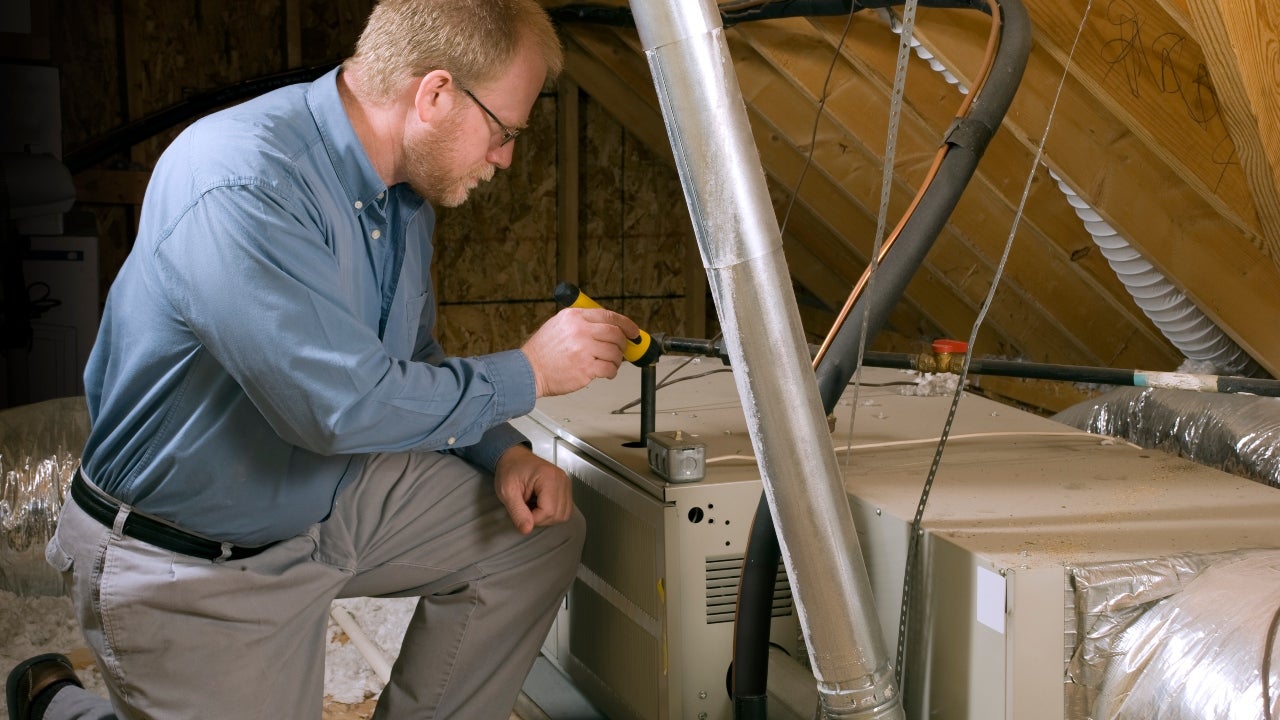Home>Home Maintenance>What Is The Difference Between Home Inspection And Appraisal


Home Maintenance
What Is The Difference Between Home Inspection And Appraisal
Modified: March 6, 2024
Discover the key distinctions between a home inspection and an appraisal. Gain insight into the importance of home maintenance with our comprehensive guide.
(Many of the links in this article redirect to a specific reviewed product. Your purchase of these products through affiliate links helps to generate commission for Storables.com, at no extra cost. Learn more)
Introduction
When it comes to buying or selling a home, several factors come into play to ensure a successful transaction. Two crucial steps in this process are the home inspection and the appraisal. While these terms may seem interchangeable, they actually serve different purposes and provide unique insights into the condition and value of a property.
In this article, we will explore the differences between a home inspection and an appraisal, their respective scopes, processes, and the role they play for both homebuyers and sellers.
Understanding these distinctions can help you navigate the real estate market with confidence and make informed decisions throughout the home buying or selling journey.
Key Takeaways:
- Home inspections focus on finding problems in a house, helping buyers make informed decisions and negotiate repairs. They don’t determine the home’s value, just its condition.
- Appraisals determine a home’s market value, helping buyers pay a fair price and lenders assess the property’s worth. They don’t focus on finding specific issues, just the overall value.
Purpose of a Home Inspection
A home inspection is a comprehensive examination of a property’s structural components, systems, and overall condition. The main purpose of a home inspection is to provide the buyer with a detailed report that highlights any existing or potential issues that may affect the safety, functionality, or value of the home.
During a home inspection, a qualified inspector will thoroughly evaluate the property, including the foundation, roof, electrical and plumbing systems, HVAC system, insulation, windows and doors, and other visible and accessible areas. They will look for signs of damage, wear and tear, code violations, and potential safety hazards.
The goal of a home inspection is to identify any major or minor issues that may require repair or maintenance. This information is vital for prospective homebuyers as it allows them to make informed decisions about the property and negotiate repairs or adjustments to the sale price, if necessary.
It is essential to note that a home inspection is not an appraisal and does not determine the value of the property. Instead, it focuses on the overall condition and functionality of the home.
Purpose of an Appraisal
An appraisal, on the other hand, is an assessment of a property’s value. The primary purpose of an appraisal is to determine the fair market value of a home, which is the price it would likely sell for in the current real estate market.
During an appraisal, a licensed appraiser will analyze various factors such as the property’s size, location, condition, comparable sales in the area, and market trends. They will also consider any unique features or improvements that may contribute to its value.
The appraisal process involves conducting a thorough inspection of the property, both inside and out. The appraiser will assess the condition of the home, its layout, the quality of construction, and the overall marketability. They will also compare the property to similar homes in the area to determine its value.
An appraisal is often required by the lender when financing a home purchase. The lender wants to ensure that the loan amount is appropriate in relation to the property’s value. The appraisal serves as a form of risk assessment for the lender, reducing the likelihood of them lending more money than the property is worth.
In addition to assisting the lender, an appraisal provides valuable information to the homebuyer. It helps them understand whether they are paying a fair price for the property or if adjustments need to be made. For sellers, an appraisal can help in setting an appropriate listing price and attracting potential buyers.
It is important to note that while an appraisal considers the condition of the property, it primarily focuses on determining its market value rather than identifying specific issues or defects that may need to be addressed.
Scope of a Home Inspection
A home inspection covers a wide range of aspects related to the condition and functionality of a property. The scope of a home inspection typically includes:
- Structural Components: The inspector will examine the foundation, walls, roof, floors, and other structural elements of the home to identify any signs of damage, cracks, or structural issues.
- Exterior: This includes an assessment of the exterior walls, siding, windows, doors, gutters, and any other visible elements. The inspector will check for proper drainage, signs of moisture intrusion, and general wear and tear.
- Roof and Attic: The inspector will assess the condition of the roof, including the shingles or tiles, flashing, chimneys, and any visible signs of leaks or damage. They will also inspect the attic for insulation, ventilation, and potential issues.
- Electrical System: The inspector will examine the electrical panel, wiring, outlets, switches, and fixtures to ensure they are in proper working order and up to code. They will also identify any safety hazards, such as outdated wiring or improper installations.
- Plumbing System: This includes inspecting the water supply lines, drains, pipes, water heater, and fixtures for leaks, proper functionality, and potential issues such as low water pressure or faulty plumbing.
- Heating, Ventilation, and Air Conditioning (HVAC) System: The inspector will evaluate the HVAC system, including the furnace, air conditioner, ductwork, filters, and thermostat. They will check for proper operation, maintenance, and potential inefficiencies.
- Interior: The inspector will assess the overall condition of the interior spaces, including walls, ceilings, floors, stairs, and doors. They will identify any visible defects, signs of water damage, mold, or other issues affecting the habitability of the home.
- Basement and Crawl Spaces: If applicable, the inspector will inspect the basement or crawl spaces to check for moisture, cracks, proper insulation, ventilation, and potential structural issues.
- Additional Systems and Components: This may include assessments of appliances, fireplaces, sprinkler systems, swimming pools, and other specific features or installations present in the home.
The scope of a home inspection may vary depending on the size, age, and type of property being inspected. It is essential to hire a qualified inspector who follows industry standards and understands the specific requirements of the type of home being inspected.
Scope of an Appraisal
The scope of an appraisal focuses primarily on determining the market value of a property. Appraisers consider various factors and conduct a thorough assessment to provide an accurate valuation. The scope of an appraisal typically includes:
- Property Inspection: Appraisers will inspect both the interior and exterior of the property to evaluate its overall condition and quality. They will assess the size, layout, and features of the home, as well as any improvements or additions.
- Comparable Market Analysis: Appraisers will research recent sales of similar properties in the area to establish a baseline for comparison. They will compare factors such as location, size, condition, and amenities to determine how the subject property measures up.
- Economic and Market Analysis: Appraisers will analyze current market trends, economic conditions, and other factors that can influence property values. This analysis helps determine how the subject property fits within the broader market context.
- Property Value Calculation: Using the information gathered, appraisers employ various approaches to estimate the value of the property. The most common approaches include the sales comparison approach, cost approach, and income approach.
- Report Preparation: Appraisers prepare a detailed appraisal report that includes their findings, methodology, and the final estimated value of the property. This report is essential for lenders, buyers, sellers, and other parties involved in the real estate transaction.
- Compliance with Standards: Appraisers adhere to specific guidelines and standards set by professional appraisal organizations and regulatory bodies. These standards ensure a consistent and unbiased approach to valuation.
It’s important to note that the scope of an appraisal primarily focuses on determining the market value of the property rather than identifying specific defects or issues. While appraisers may note apparent deficiencies that could impact the value, their main objective is to provide an objective and unbiased assessment of the property’s worth.
Appraisals are typically conducted when purchasing or refinancing a property, settling estates, or for tax-related purposes. Lenders use appraisals to ensure that the loan amount is justified by the property’s value, while buyers and sellers rely on appraisals to determine a fair market price during negotiations.
Read more: What Is The Difference Between Residential, Commercial, And Industrial Air Conditioning Applications
Differences in Process
While both a home inspection and an appraisal involve assessing a property, there are distinct differences in their processes:
Home Inspection Process:
A home inspection is typically arranged and paid for by the buyer. The process can vary, but it generally includes the following steps:
- The buyer hires a qualified home inspector who specializes in assessing the condition of residential properties.
- The inspector schedules an appointment with the buyer and conducts a thorough examination of the property, inspecting various systems, components, and structural elements.
- The inspector prepares a detailed report documenting their findings, including any issues, defects, or recommended repairs. This report is typically shared with the buyer and may be used as a negotiating tool during the homebuying process.
- The buyer and their real estate agent review the home inspection report and may request repairs, adjustments to the sale price, or further negotiations with the seller based on the findings.
Appraisal Process:
An appraisal is typically arranged and paid for by the lender or mortgage company as part of the loan approval process. The process generally involves the following steps:
- The lender hires a licensed appraiser who is knowledgeable about the local real estate market to conduct the appraisal.
- The appraiser schedules an appointment to visit the property and conducts a thorough inspection, taking into account factors such as size, condition, comparable sales, and market conditions.
- The appraiser uses various valuation methods, such as the sales comparison approach, to determine the fair market value of the property.
- The appraiser prepares a detailed appraisal report that includes their findings and the final estimated value of the property. This report is provided to the lender, buyer, and seller.
- The lender reviews the appraisal report to ensure it supports the loan amount and meets their requirements. The appraisal plays a significant role in determining the loan-to-value ratio.
It’s important to note that while buyers can hire their own inspector, they typically cannot choose the appraiser. The lender is responsible for selecting the appraiser to ensure an objective evaluation of the property’s value.
Both the home inspection and appraisal processes are crucial in the homebuying or selling journey and provide valuable insights for all parties involved. Understanding these differences helps buyers and sellers navigate the process more effectively and make informed decisions based on the findings of these assessments.
A home inspection evaluates the condition of a property, while an appraisal determines its value. Both are important in the home buying process.
Differences in Focus
While both a home inspection and an appraisal involve assessing a property, there are distinct differences in their focus:
Home Inspection Focus:
The main focus of a home inspection is to evaluate the condition and functionality of a property. A home inspector looks for signs of structural damage, mechanical issues, safety hazards, and potential maintenance concerns. They thoroughly examine the various systems and components of the home to identify any existing or potential problems that may affect its livability or value. The inspector provides a detailed report outlining their findings, which allows the buyer to make informed decisions about the property, negotiate repairs or adjustments, and plan for any necessary maintenance or upgrades.
Appraisal Focus:
The main focus of an appraisal is to determine the fair market value of a property. The appraiser assesses various factors such as the property’s size, location, condition, and recent comparable sales in the area. Their objective is to provide an unbiased valuation that accurately reflects the property’s worth in the current market. The appraisal helps lenders determine the loan-to-value ratio and ensures they are not financing more than the property’s actual value. For buyers and sellers, the appraisal provides an understanding of whether the agreed-upon price aligns with the market value and aids in making informed decisions during the transaction.
While a home inspection may reveal issues or defects in a property, an appraisal does not typically focus on identifying specific problems. Instead, the appraiser considers the overall condition of the property as one of several factors that contribute to its value. The goal is to provide an objective assessment of the property’s worth based on market data and analysis.
It is important to recognize that the focus of a home inspection is on potential problems and maintenance needs, while the focus of an appraisal is on market value. Both assessments provide valuable information to buyers, sellers, and lenders, but their purposes and focuses differ to meet distinct objectives in the real estate transaction.
Role of the Inspector
The role of a home inspector is crucial in the homebuying or selling process. Here are the key responsibilities and functions of a home inspector:
Evaluating Property Condition:
The primary role of a home inspector is to thoroughly evaluate the condition of a property. They examine various aspects, including the structure, electrical and plumbing systems, HVAC, roof, and other visible and accessible components. Their goal is to identify any existing or potential issues that may affect the safety, functionality, or value of the home.
Providing Detailed Reports:
After conducting the inspection, the home inspector prepares a detailed report that highlights their findings. The report typically includes observations, photographs, and descriptions of any defects, damage, or areas of concern. The inspector may also provide recommendations for repairs, maintenance, or further evaluations by specialists when necessary.
Ensuring Code Compliance:
Home inspectors are knowledgeable about local building codes and regulations. They assess whether a property meets the minimum safety standards required by the relevant authorities. Inspectors may identify instances of non-compliance or code violations and recommend necessary corrective action.
Offering Expert Advice:
The role of a home inspector goes beyond conducting the inspection itself. They serve as a valuable resource of information and expertise for buyers and sellers. Inspectors can address any questions or concerns the clients may have and offer guidance on how to address the issues identified in the inspection report.
Promoting Transparency and Education:
One of the essential roles of a home inspector is to promote transparency and educate the clients about the property. Inspectors strive to provide a clear understanding of the condition of the home to help buyers and sellers make informed decisions. They explain the significance of the findings, potential implications, and the importance of maintenance and regular inspections in preserving the property’s value.
Professionalism and Ethics:
A professional home inspector adheres to a strict code of ethics, ensuring impartiality, objectivity, and confidentiality. They maintain a high level of professionalism by staying updated on industry standards, advancements, and best practices. This commitment to professionalism helps build trust and confidence between the inspector, clients, and other parties involved in the transaction.
Overall, the role of the home inspector is to provide an unbiased assessment of the property’s condition and functionality. Their expertise and thorough evaluations help buyers and sellers make informed decisions, negotiate repairs or adjustments, and ensure the overall transparency and integrity of the real estate transaction.
Role of the Appraiser
The role of an appraiser is vital in determining the accurate market value of a property. Here are the key responsibilities and functions of an appraiser:
Conducting Property Inspections:
An appraiser visits the property to conduct a thorough inspection. They assess the property’s size, condition, features, and amenities to gather relevant data for valuation purposes. The appraiser pays close attention to the property’s unique characteristics that may impact its value.
Researching Market Data:
Appraisers analyze various sources of data, including recent home sales, comparable properties, and market trends. They research historical sales data to determine how the subject property compares to similar homes that have recently sold in the area. This analysis helps establish a fair market value and takes into account unique characteristics and market conditions.
Applying Valuation Techniques:
Appraisers utilize different approaches to estimate the value of a property. The most common approaches are the sales comparison approach, the cost approach, and the income approach. The chosen method depends on the property type and market conditions. By applying these techniques, appraisers ensure a comprehensive and accurate valuation.
Preparing Appraisal Reports:
After evaluating the property and analyzing the market data, the appraiser compiles a detailed appraisal report. This report includes an explanation of the appraisal process, the methodologies used, and the final estimated value of the property. The report serves as an official document that is utilized by lenders, buyers, sellers, and other parties involved in the real estate transaction.
Compliance with Industry Standards:
Appraisers adhere to professional standards and guidelines set by appraisal organizations and regulatory bodies. They maintain a high level of professionalism and ethics. These standards ensure consistency, objectivity, and integrity in the appraisal process, promoting trust and confidence among all parties involved.
Providing Expert Advice:
Appraisers offer expert advice to lenders, buyers, and sellers regarding property valuation and market conditions. They provide insights into factors that can impact the property’s value and help clients understand the basis for their valuation. This expertise helps guide individuals in making informed decisions about the property’s pricing, purchase, or sale.
The role of the appraiser is critical in supporting the lending process and ensuring that the property’s value aligns with the loan amount. Their objective evaluations and expertise contribute to maintaining a fair and transparent real estate market.
Importance for Homebuyers and Sellers
Both a home inspection and an appraisal play crucial roles in the homebuying and selling process, and their importance cannot be overstated. Let’s explore why these assessments are essential for both homebuyers and sellers:
Importance for Homebuyers:
For homebuyers, a home inspection and an appraisal provide valuable information and peace of mind:
- Understanding Property Condition: A home inspection helps buyers gain a clear understanding of the property’s condition. It reveals any existing or potential issues such as structural problems, plumbing or electrical issues, or safety hazards. With this information, buyers can make informed decisions about the property and negotiate repairs or adjustments with the seller.
- Evaluating Purchase Price: An appraisal provides an objective assessment of the property’s value. It ensures that buyers are paying a fair price based on current market conditions. If the appraisal comes in lower than the agreed-upon price, buyers may need to renegotiate the purchase price or determine if they can proceed with the purchase as planned.
- Avoiding Potential Financial Pitfalls: With the insights gained from a home inspection, buyers can identify any significant repairs or maintenance needs. This knowledge allows them to make informed decisions about their financial preparedness and avoid unexpected expenses after the purchase.
Importance for Sellers:
For sellers, a home inspection and an appraisal are equally significant, providing valuable advantages in the selling process:
- Addressing Issues Prior to Listing: A home inspection allows sellers to identify any potential issues or defects in their property before listing it for sale. By addressing these issues upfront, sellers can avoid surprises during the negotiation stage and potentially increase the property’s marketability.
- Setting the Right Listing Price: An appraisal provides sellers with an objective evaluation of their property’s market value. This knowledge helps them set an appropriate listing price and attract potential buyers who are willing to pay a fair price based on the property’s condition and market comparables.
- Building Buyer Confidence: Having a recent home inspection report and an appraisal report at hand can instill confidence in potential buyers. It shows that the seller is transparent and has taken the necessary steps to ensure the property is in good condition, which can lead to smoother negotiations and a faster sale.
Both home inspections and appraisals provide valuable insights and information to buyers and sellers. They empower buyers to make informed decisions about the property they are considering, and they help sellers understand the market value of their property and take proactive steps to ensure a successful sale. Ultimately, these assessments contribute to a fair and transparent real estate transaction for all parties involved.
Conclusion
In summary, both a home inspection and an appraisal serve distinct purposes and play important roles in the homebuying and selling process. While their goals may differ, they are both essential in providing valuable information and ensuring a smooth and informed real estate transaction.
A home inspection focuses on assessing the condition and functionality of a property, identifying any existing or potential issues that may affect its safety, functionality, or value. This examination helps buyers understand the true condition of the property they are interested in and allows them to negotiate repairs or adjustments as needed.
On the other hand, an appraisal focuses on determining the fair market value of a property. Appraisers consider various factors, including the property’s size, location, condition, and recent comparable sales, to arrive at an unbiased valuation. Appraisals provide valuable guidance to lenders, buyers, and sellers in determining a reasonable purchase price and supporting the financing process.
For homebuyers, these assessments are crucial in making informed decisions, understanding the property’s condition, and avoiding potential financial pitfalls. A comprehensive home inspection report can highlight any necessary repairs or maintenance issues, enabling buyers to plan and budget accordingly. Meanwhile, an appraisal ensures that buyers are paying a fair price based on the property’s market value.
For sellers, these assessments are equally important in properly presenting their property and determining a suitable listing price. A home inspection allows sellers to address any issues upfront and minimize surprises during negotiations. An appraisal provides sellers with a realistic market value, positioning them for success in attracting potential buyers and maximizing their return on investment.
In conclusion, both a home inspection and an appraisal contribute to a fair and transparent real estate transaction. Understanding the differences between the two and recognizing their respective roles can greatly benefit buyers, sellers, and lenders, ultimately resulting in a smoother and more confident homebuying or selling experience.
Frequently Asked Questions about What Is The Difference Between Home Inspection And Appraisal
Was this page helpful?
At Storables.com, we guarantee accurate and reliable information. Our content, validated by Expert Board Contributors, is crafted following stringent Editorial Policies. We're committed to providing you with well-researched, expert-backed insights for all your informational needs.














0 thoughts on “What Is The Difference Between Home Inspection And Appraisal”